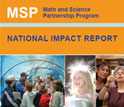|

Press Release 07-007
National Science Foundation Issues Impact Report on Math and Science Partnership Program

Program shows improvements in student proficiency in mathematics and science
January 26, 2007
The National Science Foundation (NSF) has released its first national impact report assessing the NSF Math and Science Partnership (MSP) program, which was established in 2002 to integrate the work of higher education with K-12 to strengthen and reform mathematics and science education. The document reports progress on improving teacher quality, quantity and diversity; developing challenging courses and curricula; emphasizing evidence-based design and outcomes; and promoting institutional change. It highlights examples of partnerships at all levels of education in communities across the country, and outlines impacts on student proficiency and benefits of professional development for teachers. "The work of the MSP program is critical in order for students to gain the necessary skills to both prosper in a science and technology-driven society and to meet the increasing challenges of a global economy," said Arden L. Bement, Jr., NSF director. "The MSP program is a successful model of partnering among universities and K-12 schools and corporations. As a comprehensive approach to build the learning capacity of both students and teachers, MSP develops the next generation of skilled science and technology workers." The MSP program has become a premiere research and development-focused program dedicated to improving teachers' knowledge about how students learn. One of its goals is to support tools that contribute to increased teacher content knowledge and K-12 students' learning proficiencies in the sciences, technology, engineering and mathematics. "The examples in the report of partnerships doing fruitful work across the country are but a small sample of a larger set of MSP projects that are really making a difference in local schools," said Diane Spresser, senior program coordinator for MSP at NSF. "We are learning something valuable from the work of each and every one. Educational work is very challenging, often two steps forward and one step back. While we are pleased with the findings to date, we are also very aware of how much more there is to do." In addition to the impact report, results of student proficiency data for math and science were just released by NSF for 2004-2005. Over a 3-year period, the data show the most significant improvements in mathematics proficiency, with a 13.7 percent increase for elementary, 6.2 percent increase for middle-school, and 17.1 percent increase for high-school students. Science proficiency at each level showed marked gains as well since 2002, with a 5.3 percent increase for elementary, 4.5 percent increase for middle-school, and 1.4 percent increase for high-school students. The most dramatic increases were documented by elementary grade students in mathematics, where 7.2 percent more students achieved or exceeded proficiency from 2002-2003 to 2003-2004, followed by an increase of 6.5 percent from 2003-2004 to 2004-2005. One of NSF's investment priorities is to build strong foundations and foster innovation to improve K-12 teaching, learning and evaluation in science and mathematics. The MSP program has demonstrated that the American educational system can adapt to the needs of our future workforce by reinforcing math, science, technology and engineering education. Projects in the current MSP portfolio are expected to impact more than 141,500 science and mathematics teachers and 4.2 million students in more than 550 local school districts. Since its inception, MSP has funded 89 projects. The MSP National Impact Report and executive summary can be found at the links below: MSP National Impact Report: ../news/longurl.cfm?id=51 (3,096KB)
Impact Report Executive Summary: ../news/longurl.cfm?id=50 (268KB)
-NSF-

Media Contacts
Dana Topousis, National Science Foundation (703) 292-7750 dtopousi@nsf.gov
Program Contacts
Diane Spresser, National Science Foundation (702) 292-4600 dspresse@nsf.gov

The National Science Foundation (NSF) is an independent federal agency that
supports fundamental research and education across all fields of science and
engineering, with an annual budget of $6.06 billion. NSF funds reach all 50
states through grants to over 1,900 universities and institutions. Each year,
NSF receives about 45,000 competitive requests for funding, and makes over
11,500 new funding awards. NSF also awards over $400 million in
professional and service contracts yearly.
 Get News Updates by Email Get News Updates by Email
Useful NSF Web Sites:
NSF Home Page: http://www.nsf.gov
NSF News: http://www.nsf.gov/news/
For the News Media: http://www.nsf.gov/news/newsroom.jsp
Science and Engineering Statistics: http://www.nsf.gov/statistics/
Awards Searches: http://www.nsf.gov/awardsearch/
| 



